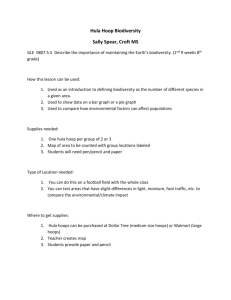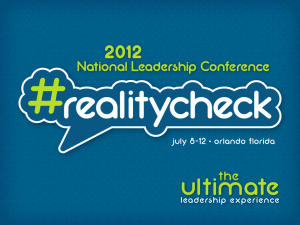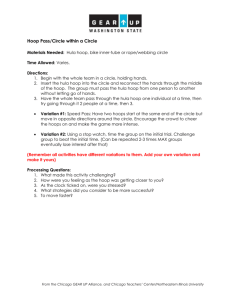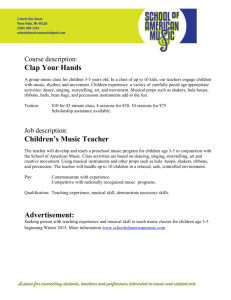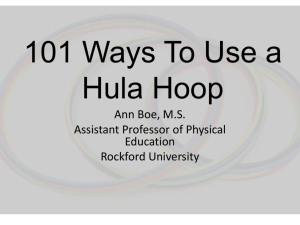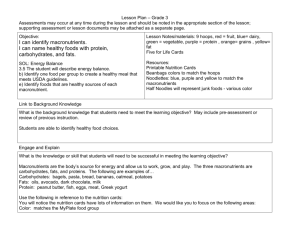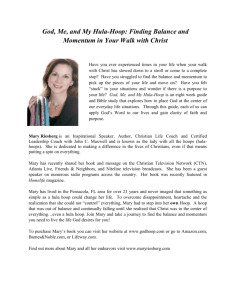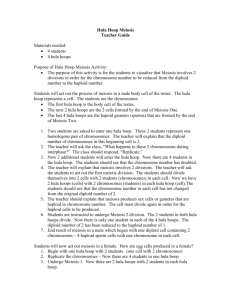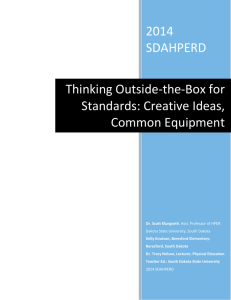Activities 09-10
advertisement
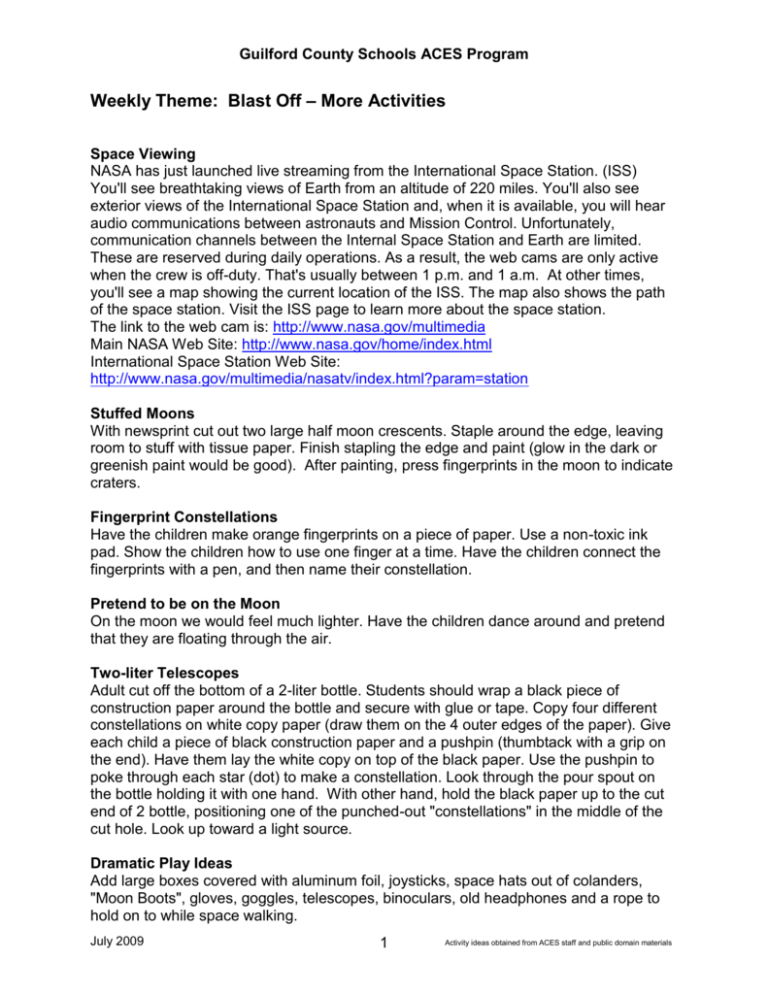
Guilford County Schools ACES Program Weekly Theme: Blast Off – More Activities Space Viewing NASA has just launched live streaming from the International Space Station. (ISS) You'll see breathtaking views of Earth from an altitude of 220 miles. You'll also see exterior views of the International Space Station and, when it is available, you will hear audio communications between astronauts and Mission Control. Unfortunately, communication channels between the Internal Space Station and Earth are limited. These are reserved during daily operations. As a result, the web cams are only active when the crew is off-duty. That's usually between 1 p.m. and 1 a.m. At other times, you'll see a map showing the current location of the ISS. The map also shows the path of the space station. Visit the ISS page to learn more about the space station. The link to the web cam is: http://www.nasa.gov/multimedia Main NASA Web Site: http://www.nasa.gov/home/index.html International Space Station Web Site: http://www.nasa.gov/multimedia/nasatv/index.html?param=station Stuffed Moons With newsprint cut out two large half moon crescents. Staple around the edge, leaving room to stuff with tissue paper. Finish stapling the edge and paint (glow in the dark or greenish paint would be good). After painting, press fingerprints in the moon to indicate craters. Fingerprint Constellations Have the children make orange fingerprints on a piece of paper. Use a non-toxic ink pad. Show the children how to use one finger at a time. Have the children connect the fingerprints with a pen, and then name their constellation. Pretend to be on the Moon On the moon we would feel much lighter. Have the children dance around and pretend that they are floating through the air. Two-liter Telescopes Adult cut off the bottom of a 2-liter bottle. Students should wrap a black piece of construction paper around the bottle and secure with glue or tape. Copy four different constellations on white copy paper (draw them on the 4 outer edges of the paper). Give each child a piece of black construction paper and a pushpin (thumbtack with a grip on the end). Have them lay the white copy on top of the black paper. Use the pushpin to poke through each star (dot) to make a constellation. Look through the pour spout on the bottle holding it with one hand. With other hand, hold the black paper up to the cut end of 2 bottle, positioning one of the punched-out "constellations" in the middle of the cut hole. Look up toward a light source. Dramatic Play Ideas Add large boxes covered with aluminum foil, joysticks, space hats out of colanders, "Moon Boots", gloves, goggles, telescopes, binoculars, old headphones and a rope to hold on to while space walking. July 2009 1 Activity ideas obtained from ACES staff and public domain materials Guilford County Schools ACES Program Meteors Wrap large Styrofoam balls with aluminum foil. Attach long streamers of crepe paper for tails. Use these to play a game of Meteor Catch! Oxygen Tanks for Astronauts Use two 1 or 2 liter plastic bottles. Tape them together. Add strips of 1 inch wide ribbon to the "tanks" to form straps (like a backpack) so the kids can wear them on their back. Moon Boots With large sponges, cut out a section in the sponge so that it fits snugly around a child's foot or shoe. Slip the sponges on their feet and they have moon boots! Rocket Launch Fill a small plastic film canister (Fuji works well) with one teaspoon of water. Quickly add one Alka-Seltzer tablet, put the lid on and place the canister on the ground with the lid side down. Wait about 10 seconds and whoosh! Your rocket should fly into the air. Robots Divide the group into groups of three or four; in each group, one person is designated the 'Master'--- the others are his 'Robots'. 'Robots' keep moving only in a straight line (walking like robots, of course) until they encounter an obstacle (edge of the area, a tree, another robot, etc.) of any kind. They then stop and start "beeping" an S.O.S. to their 'master' ---who must come and start them moving again in another direction. Perhaps a Master may want his robots to have a "unique" styled distress beep. Periodically change the Masters in each group. Musical Robots Children dance to the music in “robot fashion” until it stops. When the music stops, they freeze completely in the dancing position they were in. Anybody moving is out. Start the music again fairly quickly and keep repeating until you have a winner. Space music would be fun to use. Spaceship Commander Tag You need three hula hoops for this game. Three students that have the hula hoops are the Spaceship Commanders, and they wear the hula hoops around their waist. All the other students are Aliens. The Spaceship Commanders chase (walking, skipping, etc.) the Aliens and if get tagged must do a certain number of a specific exercise to re-enter the game (e.g. 10 Jumping jacks or 5 pushups). Generally, a student is a Spaceship Commander for 2 or 3 minutes before having them pick someone else from the opposite gender to take over their ship. Also, let the Aliens have 4 or 5 seconds head start before releasing the Spaceship Commanders. Space Invaders Students are spread throughout the gymnasium in groups of 6-8 students. In each group, three fourths (6 of 8) of the students will be standing inside hula hoops which represent personal space and one fourth of the students will be standing in general space (around/among/in between the students with the hula hoops). Each July 2009 2 Activity ideas obtained from ACES staff and public domain materials Guilford County Schools ACES Program group will be given 3 balls. The balls will be given to the students who are standing in the hula hoops. Students that are in the hula hoops are in personal space. Their objective is to complete passes to students that are open (in other hoops) and stay in their hoop as long as possible. Students that are outside the hula hoops are in general space. Their objective is to tag (gently) a student inside a hula-hoop while the student in the hula-hoop is in possession of a ball. If a student in general space tags a student in a hula hoop, the students switch roles. The student who was previously in the hoop must try to tag a student inside another hula-hoop. In order for students to stay in a hula hoop they must successfully pass the ball to a student in another hula-hoop who is open (does not have a ball) before being tagged. If students make a bad pass (not capable of being caught by another student in a hula hoop) the student in general space retrieves the ball and takes the place of the student in the hula-hoop who threw the unreachable pass. If the receiving student touches the pass but does not catch it, they may leave their hoop, retrieve the ball and return to their hoop to resume the game. Space Invaders 2 Begin by choosing 2 people to be space invaders. Then divide the class in half. One group is called stars, the other called rockets. The space invaders job is to move around the gym and tag the rockets with a gatorskin ball. The rockets must travel throughout general space (the gym) without getting tagged by a space invader or a star. The stars are to spread out in their own personal space throughout the gym. They have to keep their feet frozen but can move their arms and try to touch any rocket traveling too close to them. If a rocket gets tagged by a star or space invader, the student (rocket) has to go to a designated area in the gym to perform an exercise. After they have completed the exercise they may re-enter the game. After a few minutes switch positions so that everyone has a chance to be rockets or stars. Top Saucer Place two to four hula hoops on the ground. Have teams line up away from the hula hoops and give each team five Frisbees. "Top saucer is a game where you and your co-pilot are trying to hit down the mother ship of an alien empire. It takes a total of 21 hits to destroy the mother ship, which has threatened your planet. If your space ship (flying disc/Frisbee) lands inside the hula hoop, that counts as 2 hits. If your spaceship is touching the hula hoop, that counts as 1 hit. You take turns throwing one disc at a time and alternating with the other team. Once all of the discs have been thrown then add your points to your team’s total. July 2009 3 Activity ideas obtained from ACES staff and public domain materials
